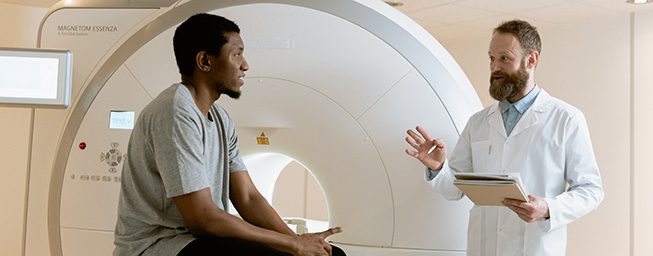Why Study a Gastroenterology Master's with Learna
We have over 10 years’ experience delivering online courses, giving you access to flexible, affordable distance learning in partnership with world-leading educators.

100% Flexible
Our courses are 100% online. No fixed study times mean you can log in and learn whenever and wherever.
Multidisciplinary - study in a group of doctors, nurses, pharmacists and other healthcare professionals.

Expert Led
All of our programmes are authored and developed by world leading experts in their field.
Our faculty are selected due to their subject expertise, experience and teaching abilities to ensure the highest standards of educational excellence.

Career Boosting
Get a University Validated postgraduate qualification in just 1 calendar year instead of 2 academic years.
40% of our alumni reported an increase in salary 2 years after studying with us.
Who is this course for?
Applicants taking our online MSc gastroenterology will typically be:
- GPs
- Doctors
- Nurses
- Physicians
How Will I Learn?
You will be supported throughout your studies by a committed team of internationally recognised educational experts.
Our courses are conducted through our interactive online learning platform, log in daily whenever and wherever you want. No fixed timetable empowers you to study when it suits you
These usually occur within groups of 10-20 students, allowing you to clearly communicate with both your tutor and fellow students.
Curriculum
The gastroenterology MSc is a two-year course, consisting of eight modules (180 credits) with the first 120 credits deriving from the Postgraduate Diploma. The second year of the MSc gastroenterology starts with an initial 10-week online module that will develop skills in critical appraisal and knowledge of research methodologies. Students then complete the professional project module, which consists of a 1,500 word proposal and 10,500 word professional project (dissertation).Year 1
Module Aims
To develop a critical understanding of the anatomy, physiology and diseases of the oesophagus.
Module Content
- Oesophagus: anatomy and physiology.
- Oesophagus diagnostic test.
- Oesophagus and Barrett’s Oesophagus.
- Vomiting.
- Oesophageal dysmotility.
- Oesophageal Cancer.
Learning Outcomes
- Critically apply anatomical and physiological functions of the oesophagus to a variety of oesophageal diseases.
- Critically appraise current methods of diagnosing and treating diseases of the oesophagus.
Module Aims
To develop a critical understanding of the anatomy, physiology and diseases of the stomach.
Module Content
- Stomach: anatomy and physiology
- Gastroscopy
- Peptic ulcer disease
- Helicobacter pylori
- Gastric cancer
- Pernicious Anemia
Learning Outcomes
- Critically apply anatomical and physiological functions of the stomach to a variety of diseases affecting the stomach.
- Critically appraise current methods of diagnosing and treating diseases of the stomach.
Module Aims
To develop a critical understanding of the anatomy, physiology and diseases of the Pancreas
Module Content
- Anatomy and physiology of Pancreas
- Pancreatic function tests
- Pancreatic insufficiency
- Acute Pancreatitis
- Chronic Pancreatitis
- Pancreatic Cysts
- Pancreatic cancer
- Neuroendocrine Tumours
Learning Outcomes
- Critically apply anatomical and physiological functions of the pancreas to a variety of diseases affecting the pancreas.
- Critically appraise current methods of diagnosing and treating diseases of the pancreas.
Module Aims
To develop a critical understanding of the anatomy, physiology and diseases of the Liver
Module Content
- Anatomy and physiology of the liver
- Liver function tests
- Cirrhosis and complications
- Cancer
- Drug and alcohol induced liver injury
- Viral liver disease
- Biliary disease
Learning Outcomes
- Critically apply anatomical and physiological functions of the liver to a variety of diseases affecting the liver.
- Critically appraise current methods of diagnosing and treating diseases of the liver.
Module Aims
- To develop a critical understanding of the anatomy, physiology and diseases of the small bowel.
- Also to learn about basic principles of managing nutrition in health and disease.
Module Content
- Anatomy and physiology of the small bowel
- Basic principles of nutrition
- Coeliac disease
- Crohn’s disease
- PEG feeding
- Bile salt malabsorption
Learning Outcomes
- Critically apply anatomical and physiological functions of the small bowel to a variety of diseases affecting the small bowel.
- Critically appraise current methods of diagnosing and treating diseases of the small bowel.
- Analyse the impact of nutrition on diseases of the small bowel.
Learning Outcomes
To develop a critical understanding of the anatomy, physiology and diseases of the colon
Module Content
- Colonic anatomy and physiology
- Irritable Bowel Syndrome
- Ulcerative Colitis
- Infective diarrhoea
- Clostridium difficle
- Colonic cancer
- Stoma: colostomy and ileostomy
- Colonoscopy, screening and diagnosis
Learning Outcomes
- Critically apply anatomical and physiological functions of the colon to a variety of diseases affecting the colon.
- Critically appraise current methods of diagnosing and treating diseases of the colon.
Year 2
Module Aims
This module is designed to help students recognise, understand, interpret and apply methods used in healthcare research and critically appraise the various methodologies specific to gastroenterology research.
Module Content
Terminology used in epidemiology and research studies such as prevalence, incidence, sensitivity, specificity, false positive and false negatives.
Interpreting graphical representation of epidemiological and statistical data such as Kaplan-Meier Curves, Forrest Plots and Meta-analyses.
Calculations used in the assessment of research data such as relative risk, absolute risk, number needed to treat.
Statistical tests and their applications including t-Tests, ANOVA, Chi-Square.
Qualitative research methods.
Fundamentals of evidence-based practice and its application into the clinical setting.
Principles of health economics, audit and quality improvement/assurance systems.
Establishing patient registers and the value of disease specific registers.
Research into educational principles for both healthcare practitioner and patient.
Understanding what may work for the patient as well as the educator.
Learning Outcomes
- Analyse and interpret research in gastroenterology medicine.
- Display a critical understanding of the clinical implications of research and its impact upon healthcare delivery and service development.
Module Aims
To develop an ability to critically evaluate areas of professional practice.
To critically appraise specific areas of clinical, research and organisational practice.
To develop skills in independent research and study.
To develop skills relevant to scientific publications.
Module Content
The module will depend on the creation of a piece of work based upon a specific clinically related project relevant to the student’s practice.
This project may comprise:
Literature review and appraisal of the evidence.
Audit of practice including organisational or clinical.
Review and implementation of evidence-based practice.
Qualitative or quantitative research (formal research involving human subjects is not anticipated).
Case-based and quality of service review with critical appraisal.
Case report, review of literature and organisational assessment.
Learning Outcomes
- Design and undertake research and development in order to produce an extensive piece of literature which may be suitable for peer-reviewed publication.
- Critically evaluate practice and suggest improvements or change.
- Incorporate knowledge of the research process in developing services appropriately.
Assessment Methods
The MSc gastroenterology places assessments at the heart of the learning process through the employment of clinical scenarios to enhance problem-solving, critical analysis and evidence-based care. Since the scenarios act as a focus for learning and assessment, the two are intrinsically linked.
The first seven modules on the course have the same assessment format and for all modules, you will be assigned a dedicated expert tutor. Your tutor will then facilitate case discussions with the group, whilst monitoring, assessing and marking your work throughout. You will also participate in a combination of module activities that may be group and/or individual based, dependent on the module.
These innovative teaching methods enable you to envisage the translation of your studies into your every day work and practice.
For the final module of the course you will be required to produce a piece of work based upon a clinically-related project that is relevant to your practice. Once you have selected a specific project, you will submit a project summary/proposal of approximately 1,500 words. Following the approval of your proposal you will then complete a 10,500 word professional project.
To produce the professional project you will continue to study online. Much of the work is self-directed, however you will receive guidance from your tutor throughout the module.
Due to the online nature of the course, you will be expected to regularly login and participate in the course - ideally on a daily basis. Students are recommended to spend around two hours per day on their studies. Our dedicated Student Support Team are also available to help with any problems you may face. From navigating our online platform to advising you on deadlines, our team can assist with any questions or challenges you may have along the way.
Year 1
- Every week students are presented with two/three clinical case-based scenarios that are reflective of every day clinical practice and research.
- Tutors will post a number of questions and prompts to aid students in a formal discussion of each case.
- These discussions are facilitated throughout by your tutor and are then assessed at the end of every module.
For this assessment, students will work on a group assignment and/or an individual assignment.
- Group assignments are designed to hone skills in the multidisciplinary, holistic approach to modern treatments and patient management by requiring group participation in a single piece of work.
- Individual assignments are designed to hone skills in academic career progression through such tasks as reviewing papers, developing scientific posters or abstracts, peer-reviewing, social media activities, patient information leaflets and essays.
- Students are provided with case-based problems in the form of a one-hour timed examination.
- The exam consists of 30 'Single Best Answer' questions.
- Students are required to complete the exam online within the set time.
The reflective journal is used by students throughout each module to monitor personal progress. This is guided by weekly feedback from your tutor and is graded at the end of every module. The journal typically includes the following:
- Initial expectations and reasons for taking the course.
- Module and/or personal learning objectives.
- Description of events, issues and learning points within current personal practice.
- Change in every day practice due to knowledge gained on each module.
- A description of what has been learned during the module.
Year 2
This module runs over an 8 week period and is designed to develop skills in critical appraisal and knowledge of research methodologies. The module consists of mandatory formative assessment activities to support your learning and development prior to the Professional Project module.
Students will work with their supervisor to submit a professional project proposal for their chosen topic.
Students will deliver an abstract (1000 words) outlining their proposal and, if deemed necessary, develop and submit documentation for the University’s ethical committee approval.
- Students will create a dissertation, the theme of which has been developed in discussion with their tutor.
- Supervision will normally involve direct online support involving planned progress, supporting research activity and reading student work.
- Supervisors and students will agree on a communications plan, which may involve emails or online chats. Some students may employ the use of freely available chat or audio conferencing facilities for live discussion with supervisors.
- Students will have access to online forums where they can develop their research capabilities together.
- All communications with tutors will be logged on the Professional Project forum by the student, and consist of brief summaries of discussion.
Entry requirements
Since our flexible MSc gastroenterology is conducted entirely online, it's accessible to both UK and international registered healthcare professionals without any international surcharges.
Applicants this gastroenterology courses will typically hold a first degree or equivalent (including international qualifications) in a relevant professional healthcare field, such as a medical or nursing degree.
Registered healthcare professionals without these recognised qualifications will be considered on an individual basis and a wide range of prior experience may be taken into account. In some cases, applicants may be asked to submit a piece of work for assessment in order to confirm that they are able to work comfortably at postgraduate level, and demonstrate the requisite clinical and professional knowledge.
Documents Required
- A copy of your updated CV including your address and date of birth.
- A copy of your undergraduate degree certificate.
- The name and email address of someone who is able to provide a reference, this can be a work colleague, employer or former tutor.
- A detailed personal statement explaining why you would like to undertake the course.
- A copy of your proof of English competency (see below).
English Language Requirements
Proficiency in the English language is also essential to completing our courses. If English is NOT your first language, we ask for proof of competency during the application process. We are able to accept an IELTS overall score of 6.0 (with a minimum of 5.5 for each band) or an equivalent qualification.
If you do not meet these requirements, please don’t worry. The University of South Wales run a number of English Language Programmes at the Centre for International English to prepare you for your academic studies. You can also contact our admissions team on admissions@diploma-msc.com for more information on the qualifications we accept.
Should you have already successfully completed the 1 year Postgraduate Diploma and wish to convert to the MSc and complete only the second year of the programme this is possible. Please contact our admissions department admissions@diploma-msc.com to find out more.
Course Fees
Option 1: Upfront Payment in full. Option 2: Interest free payments every other month for the duration of the course.
| Date | Instalments | Up-Front Payments |
|---|---|---|
| Deposit | £840 | £9,440 |
| 1st November 2024 | £840 | |
| 1st January 2025 | £840 | |
| 1st March 2025 | £840 | |
| 1st May 2025 | £840 | |
| 1st July 2025 | £840 | |
| 1st September 2025 | £733 | |
| 1st November 2025 | £733 | |
| 1st January 2026 | £733 | |
| 1st March 2026 | £733 | |
| 1st May 2026 | £733 | |
| 1st July 2026 | £735 |
† Deposits are non-refundable
†† Prices are subject to review following each intake
Option 3: Lower your monthly payments by spreading the cost for between 2 and 8 years with a loan from our lending partner Lendwise*.
*Subject to eligibility criteria.
Learna | Diploma MSc has a partnership with Lendwise which is a leading private student loan provider, to help UK students fund their course fees should they require financing. Lendwise is a UK-based education finance platform through which candidates can fund their postgraduate and professional qualification studies at leading educational institutions.
A Lendwise loan comes with a fixed interest rate for the duration of the loan (between 2 and 8 years) and no early repayment penalties. The interest rate offered will depend on the overall applicant profile and the application process is entirely online.*
*Other sources of funding are available.
Learna | Diploma MSc does not offer financial advice, recommend or endorse any financial product. You should always check the suitability of the product that is of interest to you. If you are in any doubt as to its suitability, we suggest that you seek independent professional advice.





